It is October 21, 2023, and I am standing at the junction of F and U.
The junction of F and U is on Main Street in small-town America. I saw the signs for it twice. One is next to a wine shop, and one is below an American flag. There is an arrow pointing left under the F and an arrow pointing right under the U, because here it’s F U in every direction. The junction of F and U is in western Missouri.
But the spiritual junction of F and U is in our hearts.
We drove from St. Louis to Kansas on Thursday night to meet a friend of mine beset by tragedy. I am not detailing the tragedy, because it is not public business, but it is the kind many are enduring these days. A permanent loss that divides life into a before and after and leaves you desperate to return to before. An anguish that cuts so deep, the sheer injustice of it makes you feel there must be a way to reverse time: a secret door to another life you can open if you only search hard enough, push hard enough, find a way to spare your friend this fate. But there isn’t, and you can’t.
We set out west at dusk and watched the sun set over highway billboards advertising drugs and Jesus, the sky a blazing red swirl of clouds darkening into inscrutability. We stopped for gas across from an Ozarkland souvenir store lit up in the black of night. I glanced at my phone and saw Biden was set to make a speech. I wondered if Ozarkland was where I would hear my president countenance genocide.
We went next door to a Dairy Queen that plays Fox News all day long. But by the time we sat down, Biden was done. The Fox News anchors loved Biden’s speech. They were delighted that he had pledged a record amount of unconditional aid to the Israeli government, which in less than two weeks had displaced one million Palestinians in Gaza and annihilated entire family lines. Most of the people the Israeli military killed were children, because most of the people trapped in Gaza are children. The American aid was in response to the horrific slaughter of over 1400 Israelis, most of them civilians, by the terrorist group Hamas. But the attempts at redress made no sense. American weaponry would bring neither justice nor safety to Israelis, only more pain to Palestinian innocents.
A corrupt prime minister, Netanyahu, who most Israelis despise and blame for not protecting them from the attack, had received the greatest weapon of all: American state sanction of mass murder. This is an ongoing and undeserved gift, bestowed regularly for reasons that become less fathomable the more authoritarian the Israeli government becomes. It is particularly sickening given the pleas of Israeli relatives of Hamas victims to spare civilians in Gaza. There is nothing more selfless than to plead for peace while mourning loved ones lost to violence, but their words are ignored.
In his speech, Biden paid lip service to the fact that Palestinian civilians are not the same as Hamas. But they would be killed the same way, and the US would help. The day before his speech, the US vetoed a UN resolution to pause the war to give Palestinian civilians humanitarian aid. Appalled State Department officials were reported to be considering a mutiny, but only one has quit and condemned war crimes on record. Across industries, public figures who express sympathy for Palestinians have been fired or pressured to resign or forced to undergo reeducation.
“America is a thing you can move very easily,” Netanyahu said in a 2001 conversation he allegedly did not know was being recorded. “They won't get in the way.”
Netanyahu is a liar, but he was right about that.
* * *
We stopped for the night in Olathe, a city on the Kansas side of the Kansas City metro. (For those ignorant of the Midwest, like Donald Trump, there are two KCs that sprawl over the state line to form one region.)
In September 1862, Olathe was invaded by mass-murdering Confederate leader William Quantrill. Backed by a bloodthirsty militia, Quantrill slaughtered a half dozen residents, forced the rest to pledge allegiance to the Confederacy, and stole their possessions before destroying the town. Quantrill had begun his raid in Missouri alongside Jesse James, who retains folk hero status to this day because my state has decided to venerate a murderous Confederate bank robber. In Kearney, Missouri, we saw the grave of James, covered in flowers and emblems of treason.
The raid of Olathe followed “Bleeding Kansas”: a decade of violent battles between pro-slavery and anti-slavery forces leading up to the Civil War. Quantrill’s actions culminated in the August 1863 burning of the Union stronghold of Lawrence, Kansas, where his raiders massacred over 150 people. His militia operated under the premise that Black Americans were sub-humans whose movements should be constrained, whose freedoms should be denied, and whose humanity was negligible. They believed white Americans who defended Black Americans, like abolitionist John Brown, were also deserving of death, because they rejected what Confederates saw as a natural hierarchy. For some Confederates, ideology was but a pretext to act on bloodlust. Others believed their heritage entitled them to steal land and kill with impunity.
It is a familiar refrain, sung now at home and overseas by a choir of liars, with the US government funding the show.
Quantrill is one of those Americans with an outsized influence on US history but whose name is largely forgotten because his pathology was so diabolical, powerbrokers want people to ignore it. Those types of Americans come along every decade; the one whose legacy looms largest now is mafioso McCarthyist Trump trainer Roy Cohn. Front-page scene stealers and backstage string pullers; anti-Americans posing as patriots. Men who serve their governments – their traitorous, brutal, racist governments – with vicious pride, and are rewarded with polite erasure.
Today Olathe is a low-key city of shopping plazas and downhome restaurants that serve four strips of bacon as the default breakfast amount. The streets are dotted with signs saying “Bacon for Mayor” because a man named John Bacon is up for reelection. In Olathe, sunflowers grow in the cracks of empty lots and the historical district has a building with a sign saying Heartland Bail Bonds in a friendly font. Train tracks cutting through the town make you want to trace them backward, to bear witness to the horrors of the past.
Olathe did not forget what happened. But much of the country did, because America is a thing that can be moved very easily.
* * *
We were not only retracing the scars of Bleeding Kansas. We were in the terrain of The Day After, a 1983 made-for-television movie about the Soviets decimating the United States in a nuclear war. Over 100 million Americans watched The Day After, which is set in Missouri and Kansas in the Kansas City metro region. I was too young to watch it when it aired, but my husband saw it as a child, and it terrified him. It terrified the world. It scared Americans so badly they joined peace movements. It depressed Ronald Reagan so much, he allegedly altered his policies. The Day After has never been available on streaming. It might change too many minds.
Because Kansas City is the site of so much historical and fictional violence, whenever I am there, I imagine it being destroyed. I keep those thoughts to myself while in good company. A day in Kansas City is too beautiful to ruin with my ruminations.
We visited the art museum, where paeans to truth and beauty are carved into the outer walls. It is free, like the St. Louis art museum, because in Missouri, art is still for everyone. We laughed on the lawn between Rodin’s The Thinker and The World’s Largest Shuttlecock, because in Missouri, the big and ridiculous go hand in hand with the solemn and profound. We walked by yellow and orange and red trees under a clear sky far too hot for October, but I welcomed the warmth anyway. We were owed an extra season after all we had been through.
There was an end-times feeling in the air, one removed from history or fantasy. A feeling different from the faithful finality of fall, a dual dread shaped by the distance of war and the immediacy of loss. I could envision everything being destroyed, because in other places, it happened with the casual backing of my government, and my government doesn’t care much about Americans dying either. I could picture everything being destroyed because in doing so, I was insisting that it would matter if it were.
The war and the plague and the grief pounded in my mind to the beat of a broken anthem. It had been too long since we had seen each other.
I held the hands of my children and treasured my time with my friend, because America is a thing that can be moved very easily.
* * *
On Saturday we bid farewell to my friend and headed home. It was noon when we arrived in Cole Camp at the junction of Route F and Route U. Cole Camp was an early battle site in the Civil War in a state that could not make up its mind about which side it was on, and still can’t.
Today Cole Camp is a peaceful place about an hour from the Lake of the Ozarks. When we passed the F U sign, my husband and kids could not stop laughing. We pulled over to pose for pictures with it. My husband and I felt bad acting like fools near the wine shop, so we bought a bottle to ease our guilt. I don’t drink alcohol except on float trips, when it is legally required by the state of Missouri, but it seemed a proper response. The bottle was from Stone Hill Winery, the third largest winery in the world at the turn of the 20th century. It’s now a local brand you can buy at the gas station, because Missouri is a thing that can be moved very easily.
We had three hours until we hit St. Louis, and I already missed my friend. I missed others too, people I love who are gone or leaving me soon. That’s why I cannot abide my taxes funding a war that targets innocents. That’s perhaps why public opinion on war has turned in America, because the 21st century is one of heartache.
No matter where you stand politically, you likely faced undue loss in the last few years and watched as politicians shrugged off or weaponized your grief. When you see it done to others, especially to children, the cruelty is too much to take. Americans are not as desensitized as polls claim. We just don’t know where to put all the pain we keep being told is not real.
America is a thing that can be moved very easily, but Americans are not. I’ll be at the junction of F and U, standing my ground.
The Nelson-Atkins Museum of Art featuring the World’s Largest Shuttlecock
Night falls over Ozarkland
One more F U for good measure

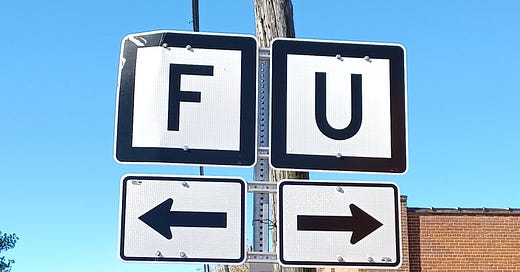


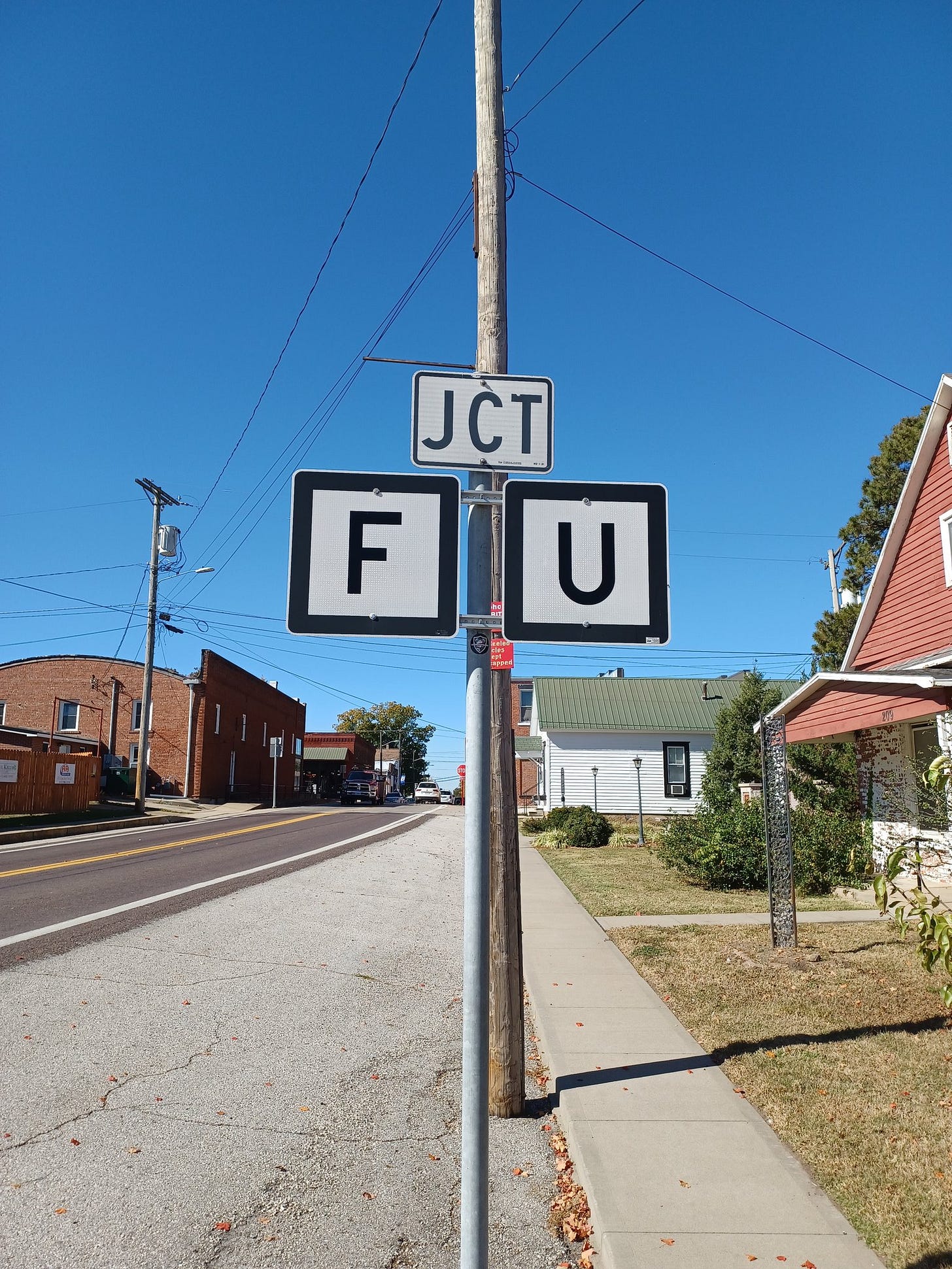

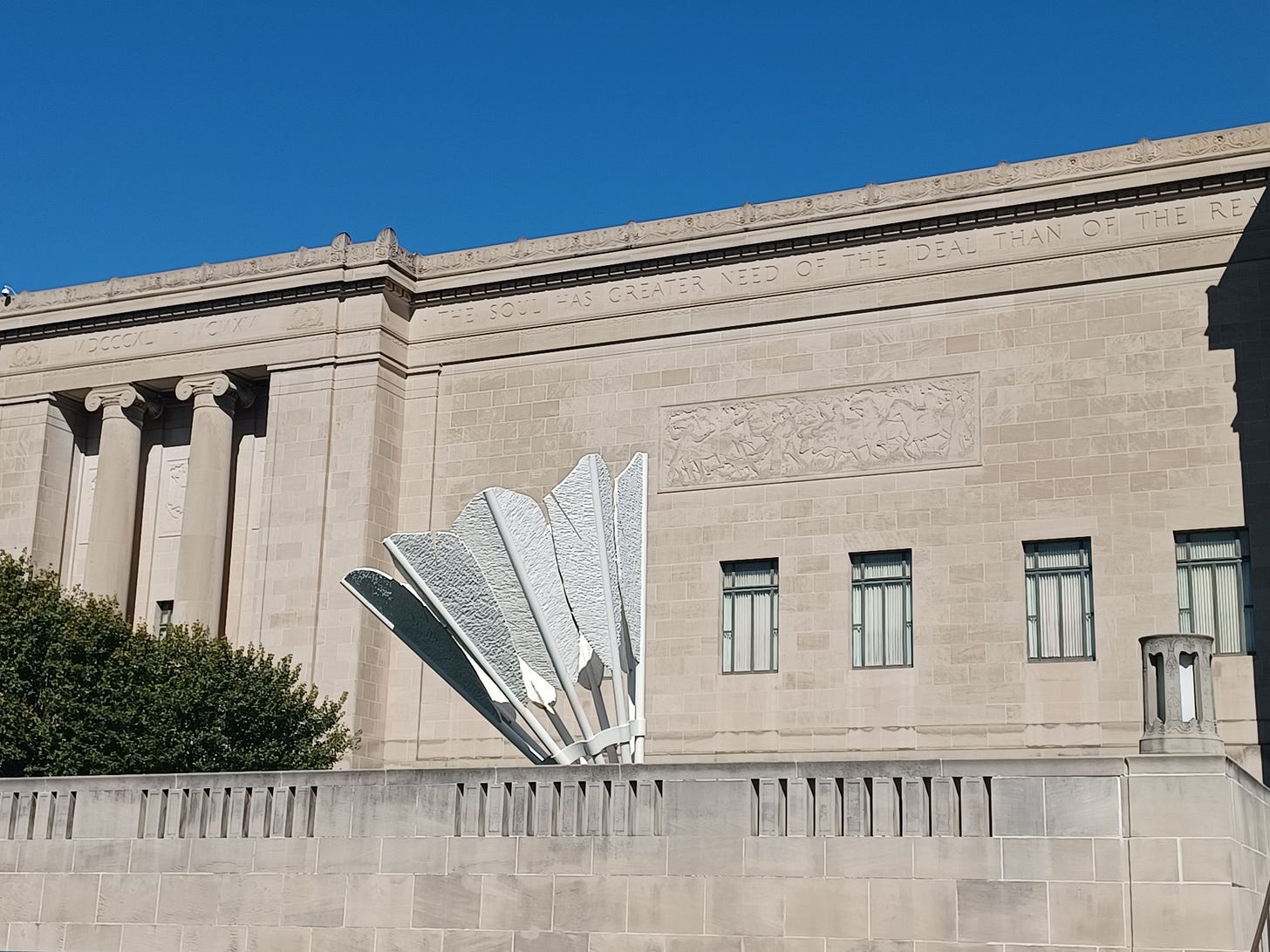
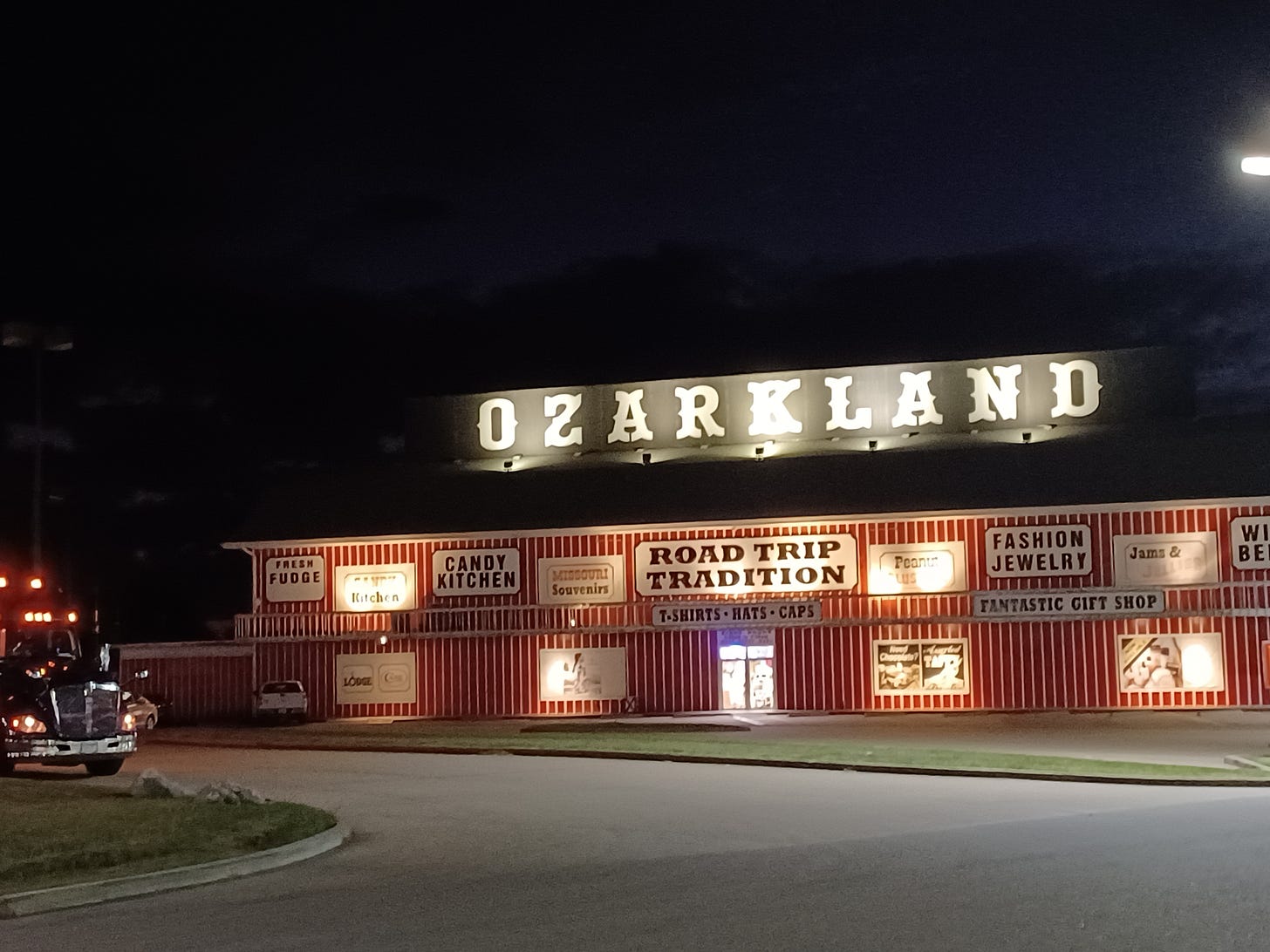
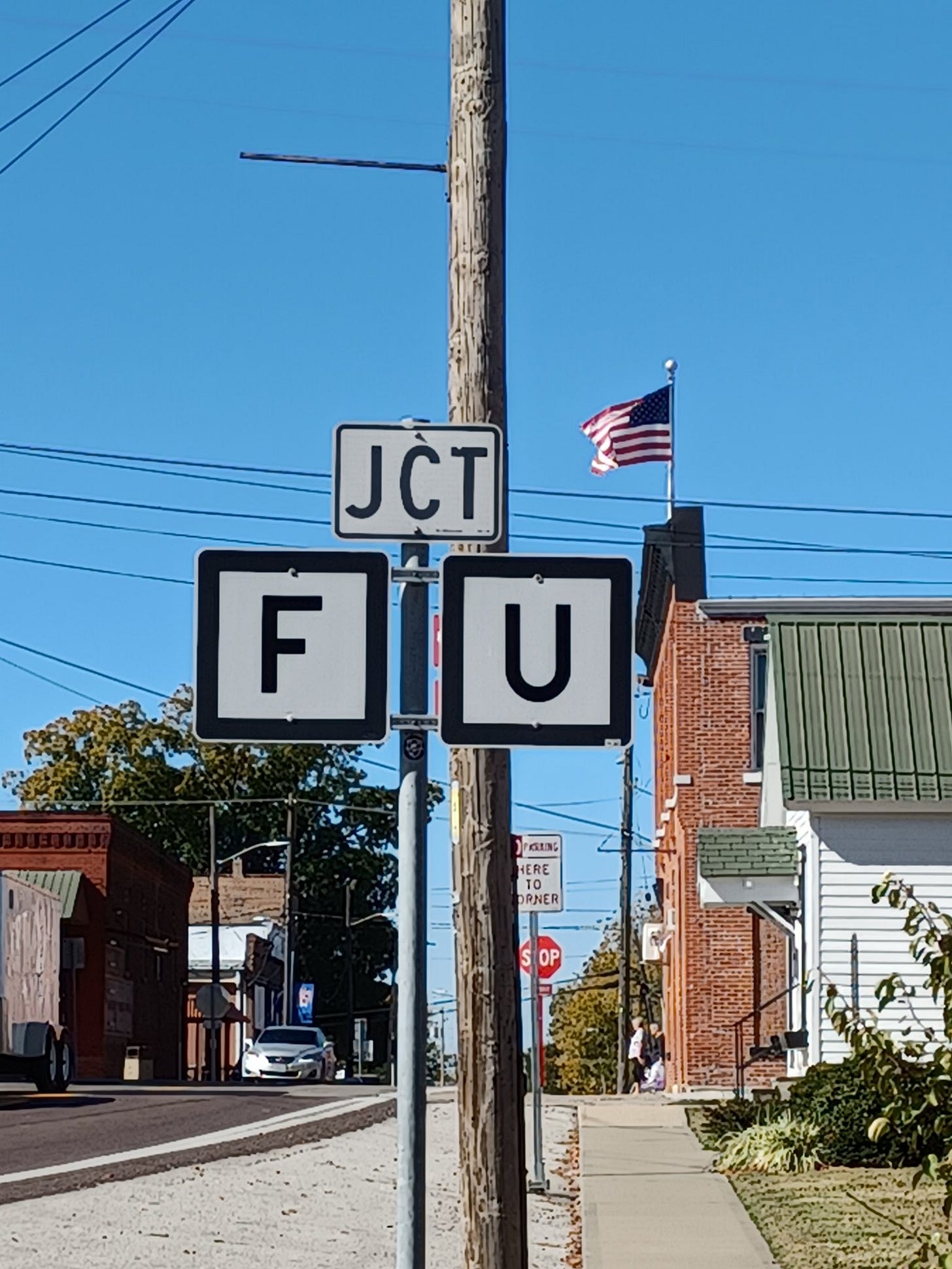
I love you so much. Even more important, perhaps, I trust you completely and am profoundly grateful for every bit of yourself you trust us enough to share with us. Thank you for the beauty and power of your writing, and your heart. I will proudly stand at the intersection of F and U with you any time!
Why is it your writing leaves me feeling at once incredibly sad and wistful, but also buoyed and inspired? Another powerful newsletter Sarah, thank you.